

What is Authoritarian Parenting? Authoritarian parenting is a parenting style characterized by high demands and low responsiveness.
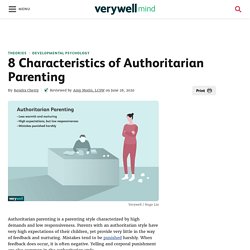
Parents with an authoritarian style have very high expectations of their children, yet provide very little in the way of feedback and nurturing. Mistakes tend to be punished harshly. When feedback does occur, it is often negative. Yelling and corporal punishment are also common in the authoritarian style. Pictorial Illustration. Video Illustration. Characteristics of Authoritarian Parents. Senior Minister Tharman highlighted the long-term psychological effects on children with authoritarian parents. SINGAPORE - As Singapore broadens its education system, parenting also needs to evolve, Deputy Prime Minister Tharman Shanmugaratnam said on Friday (Feb 15).

"Kids need a mix of high expectations set for them and encouragement to think independently, think originally and develop their own interests," he said at an education conference at Hwa Chong Institution. Citing studies in the United States on the trend of "helicopter parenting", Mr Tharman said that such behaviour - where parents hover unnecessarily over their children - has long-term psychological side effects on children. Does caning still have a place in modern-day parenting? SINGAPORE: The recent news of the father who was jailed because of the excessively harsh disciplinary measures he meted out on his son caused quite an uproar.
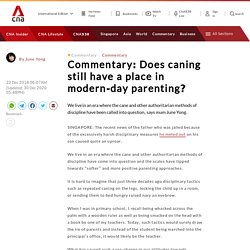
We live in an era where the cane and other authoritarian methods of discipline have come into question and the scales have tipped towards “softer” and more positive parenting approaches. It is hard to imagine that just three decades ago disciplinary tactics such as repeated caning on the legs, locking the child up in a room, or sending them to bed hungry raised nary an eyebrow. When I was in primary school, I recall being whacked across the palm with a wooden ruler as well as being smacked on the head with a book by one of my teachers. Today, such tactics would surely draw the ire of parents and instead of the student being marched into the principal’s office, it would likely be the teacher.
What has caused such a sea-change in our attitudes towards discipline? Outcomes associated with Authoritarian Parenting. What Is Authoritative Parenting? Authoritative parenting is characterized by reasonable demands and high responsiveness.
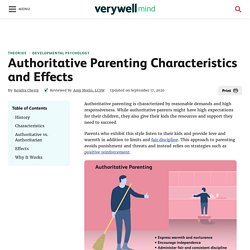
While authoritative parents might have high expectations for their children, they also give their kids the resources and support they need to succeed. Parents who exhibit this style listen to their kids and provide love and warmth in addition to limits and fair discipline. This approach to parenting avoids punishment and threats and instead relies on strategies such as positive reinforcement. Brief History During the 1960s, developmental psychologist Diana Baumrind described three different types of parenting styles: authoritarian, authoritative, and permissive. Pictorial Illustration. Video Illustration. Characteristics of Authoritative Parents. Teenagers with "hands-on” parents (parallel to authoritarian and authoritative styles) at lower risk of substance abuse. Feb. 21, 2001 (Washington) -- A 'hands-on' parenting approach of rules and supervision is crucial to helping kids stay away from alcohol, tobacco, and illegal drugs, according to a national survey of teenagers.

Results released Wednesday by the National Center on Addiction and Substance Abuse (CASA) at Columbia University indicate that teens with 'hands-on' parenting are at one-fourth the risk of substance abuse of those with 'hands-off' parents. The results are from a telephone survey of 1,000 teens aged 12-17, conducted by the center last October and November. "The family is fundamental to keeping kids drug-free," said Joseph Califano Jr., CASA president and former U.S.
Secretary of Health, Education, and Welfare. "Parents can do a lot more than they're doing. H. According to CASA, there are 12 actions of hands-on parenting that were measured in the teen survey: Continued But how much hands-on time is really possible in today's busy-busy world? Outcomes associated with Authoritative Parenting. What Is Permissive Parenting? Permissive parenting is a type of parenting style characterized by low demands with high responsiveness.
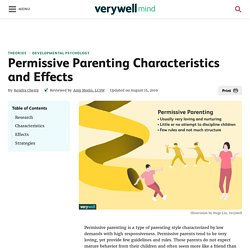
Permissive parents tend to be very loving, yet provide few guidelines and rules. These parents do not expect mature behavior from their children and often seem more like a friend than a parental figure. Pictorial Illustration. Video Illustration. Characteristics of Permissive Parents. Have Sweden’s permissive parents given birth to a generation of monsters? Yes, those very countries that once prided themselves on their enlightened, child-centred parenting style are, it seems, having second thoughts about the wisdom of letting their offspring do what they want, whenever they want.

A best-selling Swedish academic has concluded that permissive parenting is creating a generation of arrogant young adults who lack social empathy, personal resilience and, after a childhood of pampering, are destined to be bitterly disappointed in life. “Saying 'no’ to a child is not the same as beating a child. Parents should act like parents, not best friends,” says David Eberhard, psychiatrist, father of six and author of How Children Took Power. “They should prepare their kids for adult life by teaching them how to behave, not treat them like princes or princesses. In Sweden, they think that any form of intervention against the child is a sort of molesting. “The so-called experts think that parents should negotiate, rather than punish.
Outcomes associated with Permissive Parenting. What is Uninvolved Parenting? Uninvolved parenting, sometimes referred to as neglectful parenting, is a style characterized by a lack of responsiveness to a child's needs.
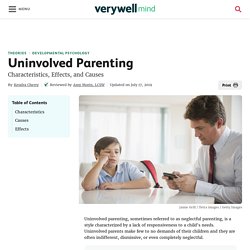
Uninvolved parents make few to no demands of their children and they are often indifferent, dismissive, or even completely neglectful. The Major Parenting Styles During the 1960s, psychologist Diana Baumrind described three different parenting styles based on her research with preschool-age children: authoritarian, authoritative, and permissive parenting. In later years, researchers added a fourth style known as uninvolved parenting. Pictorial Illustration. Video Illustration.
Characteristics of Uninvolved Parents. How does parental absence affect children? Looking at Elise Ishimwe for the first time, it is not hard to notice that he is aloof and rarely mingles with others.

He is eleven years old; the last time he saw his mother was when he was around five. His father’s presence is on and off. He is being raised by relatives and for him, the notion of basking in the unrelenting love of parents is a far-fetched dream. At times circumstances can make it impossible for parents to be involved in their children’s lives yet the impact of this for the young ones is disheartening. Counsellor Damien Mouzoun says it is unfortunately rampant in society nowadays to have one of the parents abandon their children, even in homogeneous societies backed by principles which used to guard communities from this kind of situation. For various reasons ranging from separation, divorce, profession and death, to many others, we have witnessed in our society cases of single parenting, mostly affecting mothers and children, he says.
Outcomes associated with Uninvolved Parenting. How the Parenting Styles Differ. Summary.